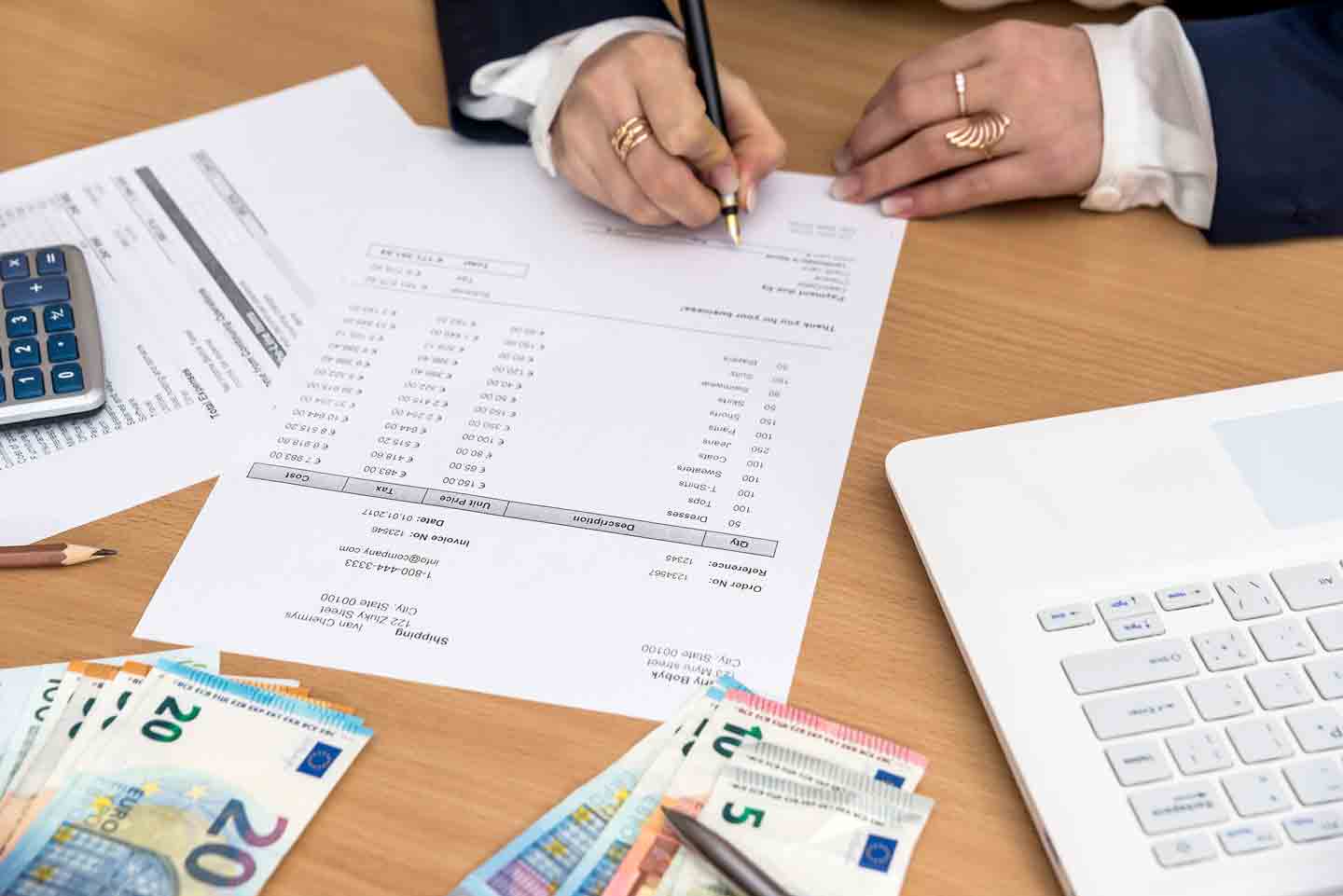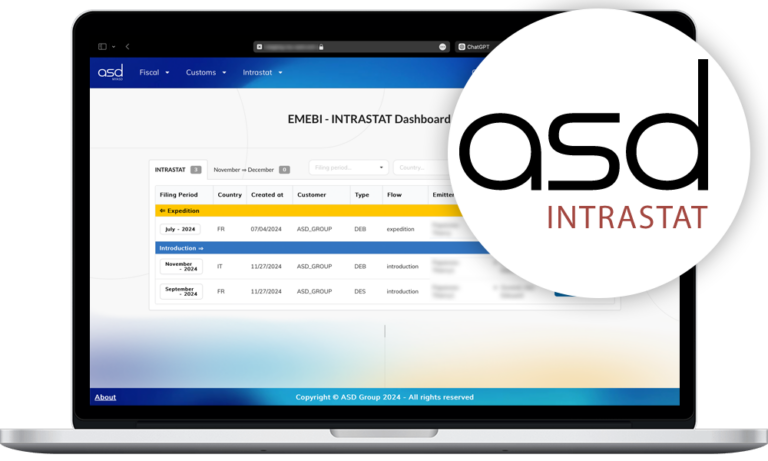HOME > CUSTOMS REPORTING AND STATISTICAL OBLIGATIONS > INTRASTAT REPORTING
We take care of your Intrastat reporting so you can take care of your business
YOUR EU TRADE, OUR INTRASTAT EXPERTISE – CUT COSTS AND SIMPLIFY YOUR COMPLIANCE.
YOUR EU TRADE, OUR INTRASTAT EXPERTISE – CUT COSTS AND SIMPLIFY YOUR COMPLIANCE.
Intrastat is a system designed to collect statistical data on the trade of goods between European Union (EU) member countries. Established in 1993 following the creation of the single market, it replaced the former internal customs declarations to ensure precise monitoring of goods flows within the EU. In France, this system has been called EMEBI (Monthly Survey on Intra-EU Trade of Goods – enquête mensuelle sur les échanges de biens intra-UE in French) since January 1, 2022. It replaces the former DEB (Declaration of Exchange of Goods – Déclaration d’échanges de biens in French), which previously combined two components: EMEBI and the VAT recap report (ERTVA) related to intra-community deliveries.
Companies whose turnover exceeds a threshold set annually by the authorities in their country are required to submit detailed monthly reports on their intra-EU flows, whether it involves dispatches or arrivals of goods. These declarations must include, in particular, the value of the goods, quantities, product codes (TARIC), as well as the countries of dispatch or origin.
Information from Intrastat/EMEBI is strategically important for governments and European institutions, as it allows the production of accurate statistics on intra-European trade. These data are then used to guide economic policies, assess commercial exchanges, and perform various economic analyses. Thanks to this overview of goods movements between member states, Intrastat/EMEBI is an indispensable tool for understanding and managing economic relations within the European Union.
In addition to Intrastat, an EC Sales List (ESL) must also be submitted. The EC Sales List is mandatory for all B2B shipments to other EU countries, starting from the first euro, regardless of the amount. It allows tax authorities to monitor VAT compliance by reporting the VAT numbers of customers and sales amounts.
Companies whose trade in goods with other European Union countries exceeds a threshold set annually by their Member State are required to submit an Intrastat declaration. This threshold, which varies by country, may also differ depending on whether it concerns dispatches or arrivals of goods.

All tangible goods moving between EU member states must be reported, except in certain specific cases, such as goods in transit, items sent for repair, or commercial samples with no commercial value.
In some countries, including France, a simplified threshold is set. Beyond this threshold, companies must provide more detailed information, including product classification codes and statistical value.
Certain specific types of transactions may also trigger an Intrastat reporting obligation, such as distance sales, internal transfers of a company's assets from one member state to another, or the movement of goods on consignment.
Shipments: refers to the sending of goods from one EU member state to another. Arrivals: refers to the receipt of goods coming from another member state into the country where the company is established.
A sanction regime applies in case of non-compliance with the Intrastat/EMEBI (formerly DEB in France) reporting obligation or errors in the declaration, in accordance with articles 1788e of the French General Tax Code (CGI) and 467‑4 of the Customs Code.
A fine of €750 is imposed for each missing or late declaration. This penalty may be doubled to €1,500 if the declarant does not regularize their situation within 30 days following the formal notice. In addition, each omission or error in a declaration incurs a fine of €15, capped at a total of €1,500.
Furthermore, customs authorities have extensive powers to audit Intrastat/EMEBI declarations: they can request information, require supplementary declarations, and hold meetings. Failure to meet response deadlines may result in financial penalties.
In some countries, including France, a simplified threshold is set. Beyond this threshold, companies must provide more detailed information, including product classification codes and statistical value.
Looking to simplify your Intrastat declarations without the administrative hassle, but facing these challenges?
Intrastat rules vary across the EU, creating challenges in understanding requirements and staying compliant.
Reporting rules and thresholds often change, requiring ongoing vigilance to ensure compliance with the latest requirements.
Ensuring the accuracy and completeness of collected data is a real challenge. Companies often handle a large volume of information related to intra-Community transactions, which can lead to errors.
Detecting and correcting anomalies or inconsistencies in the data can be challenging. Companies must implement mechanisms to check and validate the data before submission.
A lack of dedicated resources or external support can prevent some companies from properly managing Intrastat declarations, increasing their exposure to the risk of non-compliance.
Processing and submitting Intrastat declarations can be tedious and administratively heavy, especially for companies with a high volume of transactions within the EU.
ASD Group supports you in overcoming these challenges efficiently.
ASD Group provides you with skilled Intrastat specialists to streamline your administrative and regulatory procedures. With their in-depth expertise in customs and international regulations, they guide you at every step, saving you time, reducing costly errors, and allowing you to focus on growing your business.

All relevant information on your intra-Community transactions, such as goods, volumes, amounts, and partners, is collected by us.

The information collected is thoroughly checked by us to ensure its accuracy and compliance with Intrastat rules, particularly regarding commodity codes, the countries involved, and applicable thresholds.

Intrastat declarations are prepared by us in accordance with official requirements and submitted within the regulatory deadlines.

After submission, we provide proactive follow-up to address any inquiries from the authorities and offer ongoing support to optimize your reporting processes.
Tired of dealing with the complexities of Intrastat declarations across the EU?
Simplify your life with ASD Intrastat – your fast, centralized solution!

Made up of Intrastat specialists, our team provides you with precise recommendations and personalised support.
A guarantee of work quality and optimal protection of your declarations, ensuring your data is secure and risks are minimized.
Our customised software allows you to efficiently monitor flows and thresholds, manage data electronically, and automate reminders for important dates. You can manage everything easily via our 100% online platform, MyASD.
For over 25 years, our expertise has made us a reliable contact for European tax and customs authorities, ensuring the protection of your business and enhancing your reputation with the authorities.
We guarantee a response to all your requests within 48 working hours, ensuring clear and effective communication throughout the process.
Our specialists provide continuous monitoring of regulatory changes, ensuring you are always up to date and able to adjust your practices without delay.
Each client is assigned a dedicated account manager who guides them at every step, ensuring personalized support and a long-lasting, trusted relationship.

Intrastat in Germany

Intrastat in Austria

Intrastat in Belgium

Intrastat in Croatia

Intrastat in Denmark

Intrastat in Spain

Intrastat in Estonia

Intrastat in Finland

EMEBI in France

Intrastat in Greece

Intrastat in Ireland

Intrastat in Italy

Intrastat in Latvia

Intrastat in Lithuania

Intrastat in Luxembourg

Intrastat in the Netherlands

Intrastat in Poland

Intrastat in Portugal

Intrastat en Czechia

Intrastat en Slovakia

Intrastat en Slovenia




